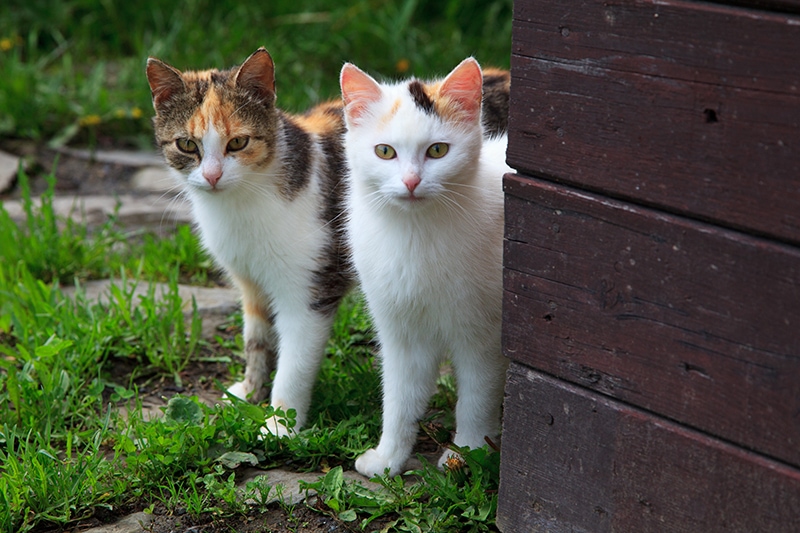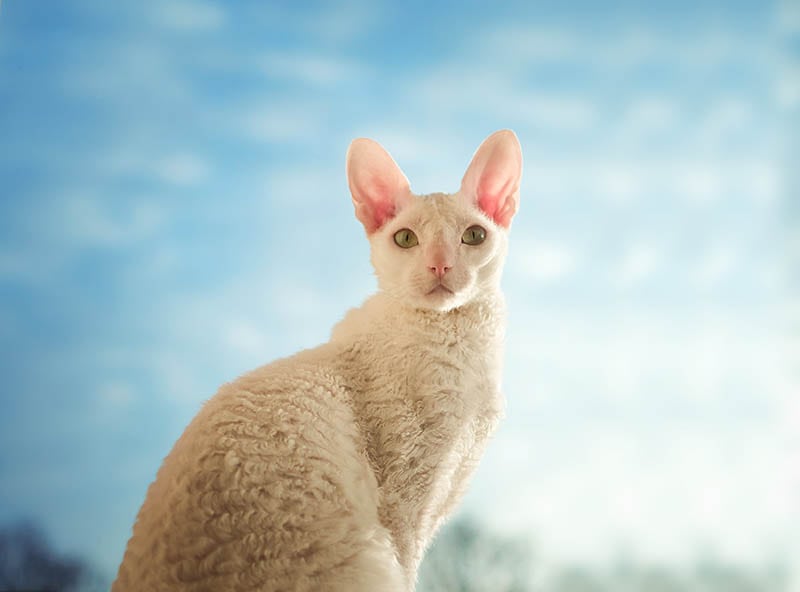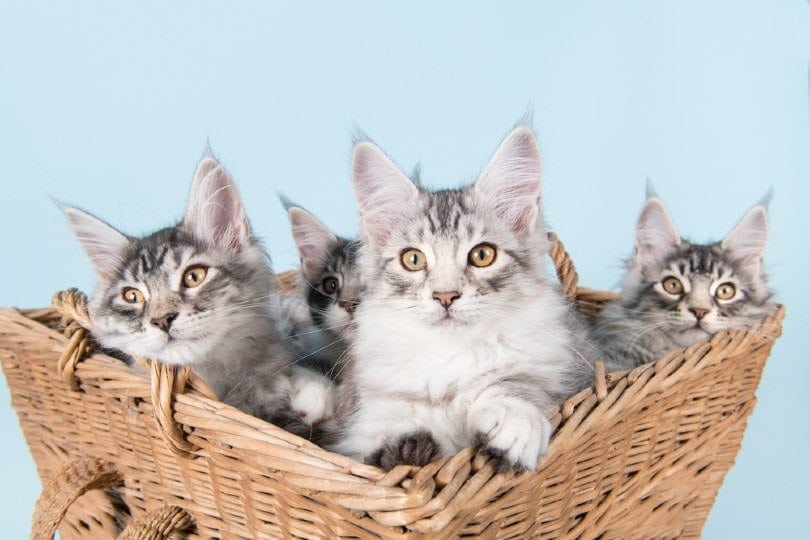Why Do My Cat’s Farts Smell Like Eggs? Vet-Reviewed Health Facts & Tips
Updated on
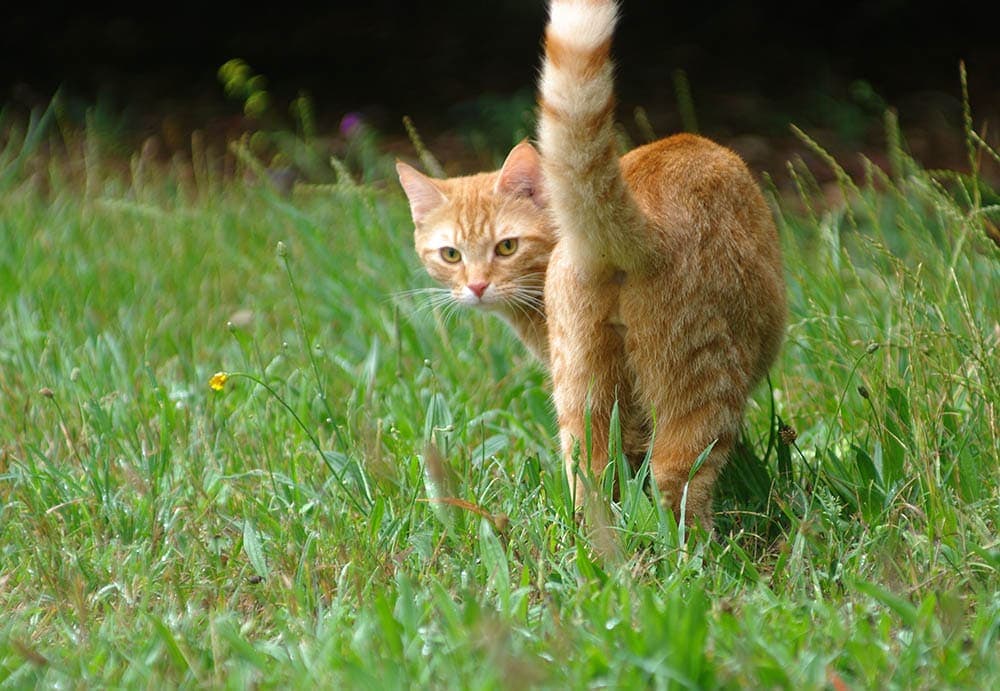
This article has been fact checked and reviewed by a qualified veterinarian using information available at the time of review. However, the purpose of this article is not to replace a veterinary examination and advice but rather provide a general guide to medical conditions. Cat owners are urged to seek tailored advice for their pet from a veterinary professional. The views and opinions expressed in this article are those of the writer.
Click to Skip Ahead
Every dog owner must admit this: They have at least once blamed their poor pup for the sudden stench in the room! But what if the real source of the stench was of feline origin? It’s true that cats, being such graceful and dignified creatures, are not generally associated with foul odors. Yet our feline friends also pass gas from time to time, though real stinky farts aren’t that common.
Just like in dogs and humans, smelly farts can come and go, but if that nasty odor persists, it could be a sign of an underlying problem. So, what should you do if your adorable kitty suddenly starts to emit farts that smell like rotten eggs? Keep reading to find out!
Why Do My Cat’s Farts Smell Like Rotten Eggs?
Here’s a clue to the culprit: hydrogen sulfide. This gas is usually produced by bacteria breaking down food in the digestive system, which can lead to an unpleasant rotten egg smell.
It’s normal for cats’ farts to stink a little, given their high animal protein intake. However, frequent and particularly foul-smelling flatulence may be associated with an underlying health problem.
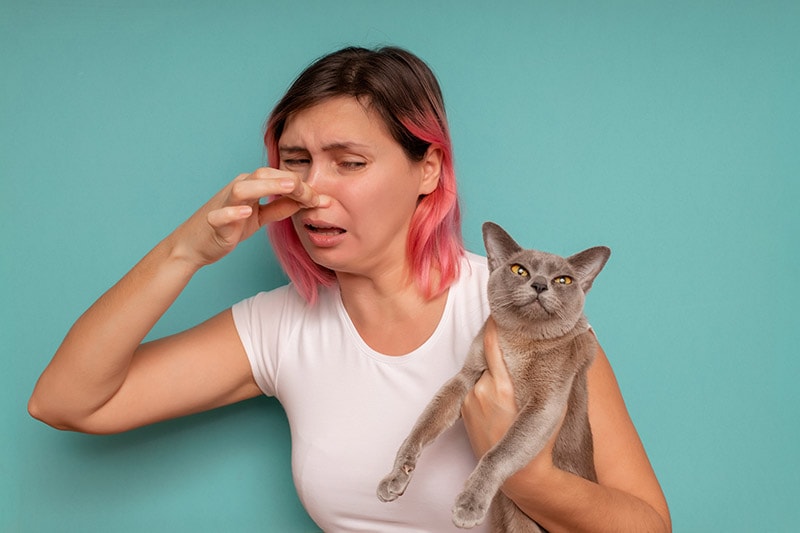
Why Do Cats Fart?
Although cats pass gas from time to time, it shouldn’t happen every day. So, what can cause your cat to let out an unwelcome toot from time to time?
A sudden switch in your cat’s diet without a gradual 7–10-day transition period can be a common culprit behind feline flatulence. According to the World Small Animal Veterinary Association, food allergies or sensitivities can also contribute to excessive gas in cats. In fact, food is considered one of the main causes of cat farts.
That said, flatulence in cats can sometimes be a sign of an underlying condition. Here are potential health issues that may require medical attention.
1. Intestinal Parasites
If your cat has intestinal parasites like worms, this can disrupt their intestinal flora. Fortunately, this condition is easily resolved with deworming medications.
- Giardia duodenalis
- Tritichomonas foetus
- Crypstosporidium spp.
These parasites are usually diagnosed by a veterinarian through fecal testing.
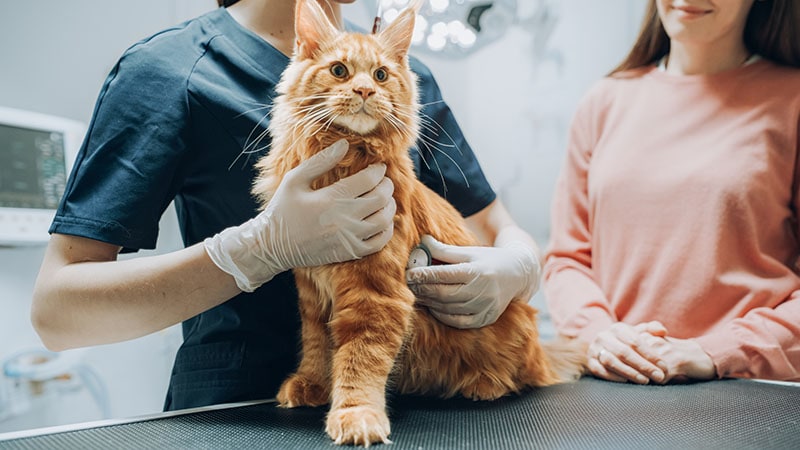
2. Infection
Bacterial infections can affect your cat’s gut flora, also called the gastrointestinal microbiome, where all the “good” bacteria in the gut are working together to maintain your cat’s health. The overgrowth of “bad” bacteria can lead to an inflamed gastrointestinal tract and foul-smelling gases. Viral infections such as feline parvovirus and feline coronavirus (which is not a respiratory virus in cats!) can also cause an intestinal upset. And any cause of intestinal upsets can change the gastrointestinal microbiome as a secondary effect. Which is why probiotics are often used in treatment to introduce good bacteria into the gut.
3. Gastrointestinal Obstruction
Gastrointestinal obstruction is the blockage of the digestive tract that can be caused by various factors, such as tumors or ingestion of a foreign object. This obstruction disrupts food and fluid passage and can damage digestive tissues. Gastrointestinal obstruction is a medical emergency and poses life-threatening risks to your cat if not treated in time.
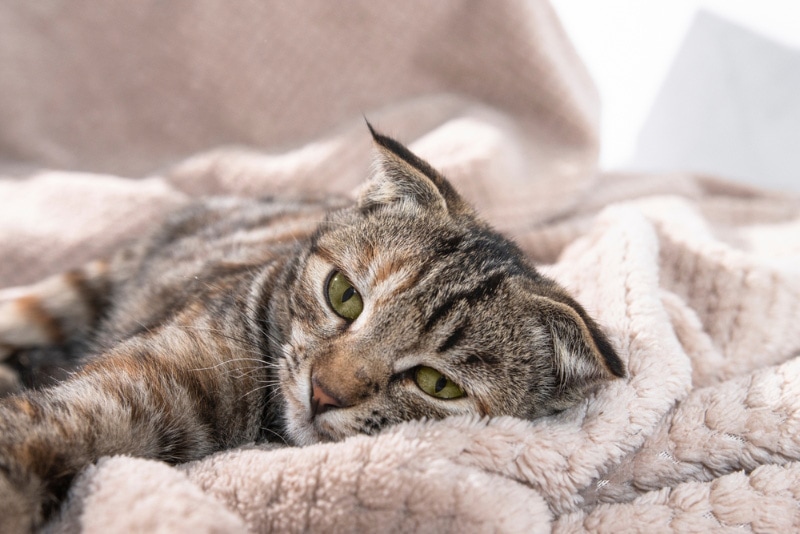
4. Small Intestinal Bacterial Overgrowth (SIBO)
SIBO is a condition marked by an imbalance in your cat’s gut microbiome. While a certain level of bacteria in the small intestine is normal, SIBO occurs when there’s an accumulation of an abnormal number of bacteria. This can disrupt normal intestinal function, leading to signs like loose stools, rapid weight loss, diarrhea, occasional vomiting, and intestinal sounds due to gas.
5. Inflammatory Bowel Disease (IBD)
Just like humans, cats can have IBD, which leads to many digestive issues. It’s one of the most common intestinal disorders in felines and a common cause of chronic weight loss and gastrointestinal disorders. Common signs include vomiting, diarrhea, changes in appetite, and weight loss. Cats with IBD may also have concurrent inflammatory liver disease, pancreatitis, or even intestinal tumors.
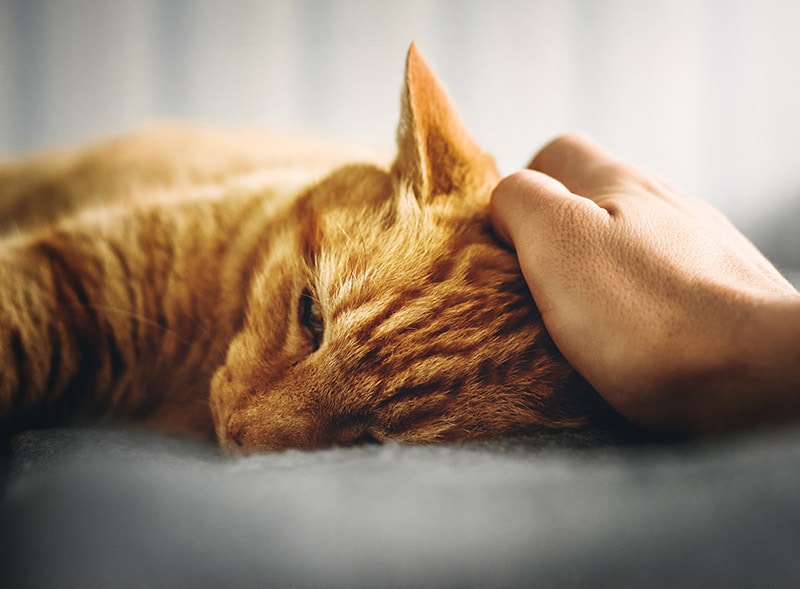
6. Nutrients Malabsorption
Nutrient malabsorption, a condition in which the body inefficiently absorbs nutrients, can be a reason for flatulence in cats. This condition can be due to the lack of certain essential digestive enzymes from the pancreas, which can lead to pancreatic insufficiency. IBD, infections, dietary sensitivities, or cancers can also lead to poor absorption of nutrients.
When Should You Take Your Cat to the Vet?
In addition to relying on your nose to detect your cat’s stinky farts, it’s essential to monitor their eating and pooping habits and be alert for certain signs of gastrointestinal issues, such as:
- Diarrhea
- Vomiting
- Lethargy
- Bloating
- Bloody stools
- Loss of appetite
- Straining in litter box
If you notice any of these signs, it is best to contact your veterinarian as soon as possible.
Tips for a Healthy Diet and a Fart-Free Cat
If your vet has ruled out any health issues and thinks that your cat’s stinky farts are probably related to something that they eat, that’s good news. With a few adjustments to their diet, your cat should regain their elegant and delicate nature of a monarch whose farts are odorless and infrequent.
Here are a few tips to help your cat return to a life without (or nearly so) flatulence.
1. Ask Your Veterinarian for a Diet Tailored to Your Cat’s Needs
In general, a feline diet that aids digestion and optimizes nutrient absorption consists of high-quality animal proteins, fats, and not too much carbohydrates and fiber. It can be a mix of dry and wet food, but that depends on your cat’s specific needs based on their age, lifestyle, specific health conditions, etc. It’s important to work with your veterinarian so you know exactly what to feed your cat.

2. Avoid Any Sudden Changes in Foods
Even if the new diet has been recommended by your veterinarian, don’t throw out the old bag, and start feeding your cat the new food without prior transition. The smoother the process, the better off your cat’s intestines will be. Make the transition throughout 7 to 10 days, gradually increasing the amount of new food each day.
3. Make Sure Water Is Always Available
Water will help make everything run smoother in your cat’s digestive system, supporting the intestinal tract, and preventing feces from getting stuck in the colon.
4. Monitor Your Cat’s Pooping Habits
If your cat uses a litter box, that’s perfect. This makes it easier to monitor the frequency, texture, and appearance of their stools. It will be trickier if they poop outside, though, so you may need to watch for other signs of gastrointestinal distress or keep them inside if you suspect they are unwell.
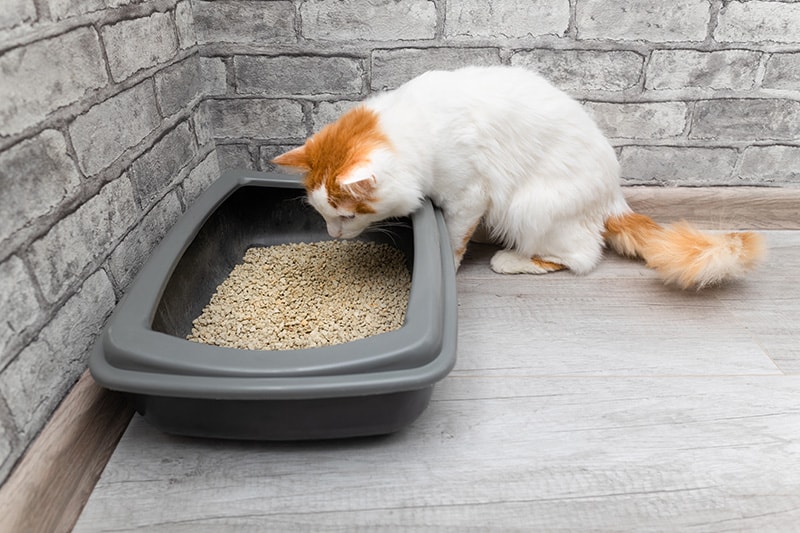
Conclusion
As dainty and graceful as they are, cats are not immune to the occasional fart. That said, particularly stinky flatulence may indicate underlying health issues, such as food intolerance or intestinal parasites. Therefore, if you notice changes in the frequency and/or smell of your cat’s farts, do not hesitate to discuss it with your veterinarian. They will be able to recommend dietary changes if that’s the issue, which should enable your precious cat to regain their dignity!
Featured Image Credit: STGEEVES, Shutterstock


